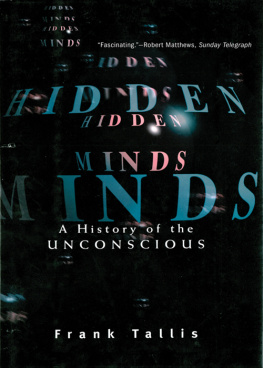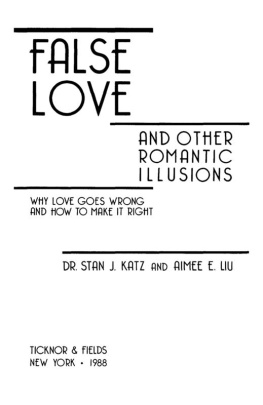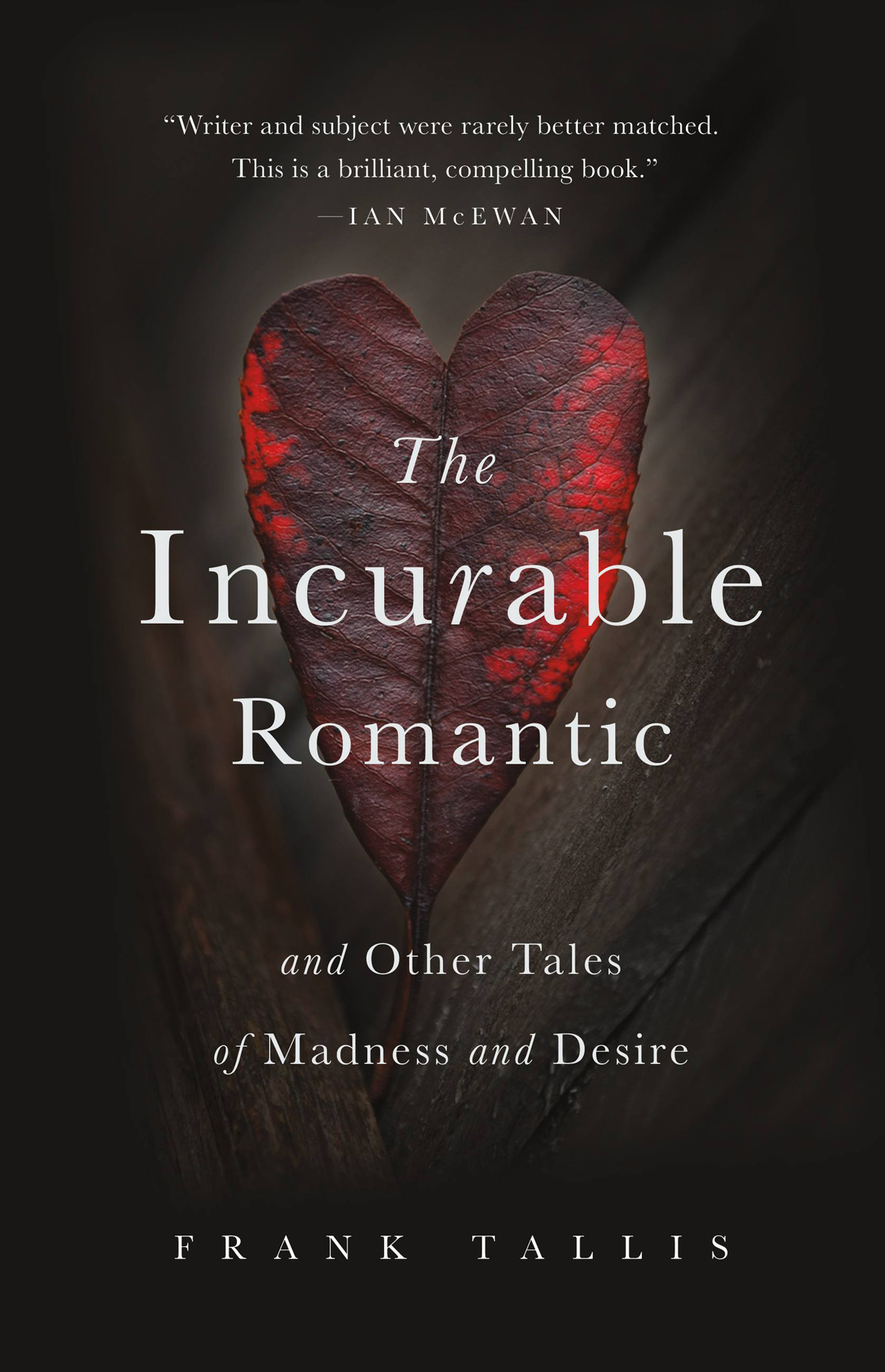Copyright 2018 by Frank Tallis
Hachette Book Group supports the right to free expression and the value of copyright. The purpose of copyright is to encourage writers and artists to produce the creative works that enrich our culture.
The scanning, uploading, and distribution of this book without permission is a theft of the authors intellectual property. If you would like permission to use material from the book (other than for review purposes), please contact permissions@hbgusa.com. Thank you for your support of the authors rights.
Basic Books
Hachette Book Group
1290 Avenue of the Americas, New York, NY 10104
www.basicbooks.com
Originally published in hardcover and ebook by Little, Brown, UK in June 2018.
First US Edition: September 2018
Published by Basic Books, an imprint of Perseus Books, LLC, a subsidiary of Hachette Book Group, Inc. The Basic Books trademark and logo is a trademark of the Hachette Book Group.
The Hachette Speakers Bureau provides a wide range of authors for speaking events. To find out more, go to www.hachettespeakersbureau.com or call (866) 376-6591.
The publisher is not responsible for websites (or their content) that are not owned by the publisher.
Library of Congress Cataloging-in-Publication Data
Names: Tallis, Frank, author.
Title: The incurable romantic and other tales of madness and desire / Frank Tallis.
Description: First US edition. | New York : Basic Books, 2018. | Includes bibliographical references and index.
Identifiers: LCCN 2017056452 (print) | LCCN 2017059529 (ebook) | ISBN 9781541617537 (ebook) | ISBN 9781541617551 (hardcover : alk. paper)
Subjects: LCSH: Love. | Sex. | Compulsive behavior. | MESH: Love | Behavior, Addictive | Psychotherapy | Case Reports | Personal Narratives
Classification: LCC BF575.L8 (ebook) | LCC BF575.L8 T35 2018 (print) | DDC 152.4/1dc23
LC record available at https://lccn.loc.gov/2017056452
ISBNs: 978-1-5416-1755-1 (hardcover), 978-1-5416-1753-7 (ebook)
E3-20180804-JV-NF
To Nicola, incurably.
The Roman philosopher Lucretius is famous for writing an extended poem titled On the Nature of Things. It contains sections on a wide range of subjects, such as the movement of atoms, the cosmos, timeand a great deal of psychology.
Among Lucretiuss writings on the mind and behaviour is a description of what happens when people fall in love. He observes that the besotted frequently become agitated and stirred up by insatiable desires. Sexual union, often passionate and violent, results in only temporary relief, because lovers always want more of each other. Lucretius seems to be describing an addiction. He uses language that suggests that falling in love is a little like becoming ill or, even worse, going mad. Love, he says, is like an unconquerable disease and lovers waste away from wounds that cant be seen. They are love sick: weak and neglectful of responsibilities, they behave foolishly and fritter away fortunes on excessive gifts; they become jealous and insecure.
After describing all these symptoms, Lucretius employs a device that many stand-up comedians use. He subverts our expectations to make us laugh. He says: Thats what loves like when things are goodjust imagine what its like when things get bad. All of a sudden, he is no longer a classical philosopher but a friend or drinking companion.
Lucretius proceeds to tell us what happens when love goes wrong. Lovers become delusional and lose the power to make objective judgements. They experience a kind of ongoing hallucination. Ordinariness, or even ugliness, is perceived as outstanding beauty. They cant keep away from their beloved, and everyone else in the world becomes insignificant. Lovers become abject and helpless, and what pleasures they enjoysensuality, mutual delightserve only to limit them. The goddess of love, Lucretius warns, has sturdy fetters.
Its interesting, even remarkable, that a Roman philosopher, dead for over two thousand years, can supply us with a description of love sickness that we all recognise. In this respect, it doesnt seem that human nature has changed very much since classical times. But Lucretius doesnt stop there. He refines his argument and makes a distinction between love going well and love going wronglove that is normal and abnormal love. In a more general sense, the whole discipline of psychiatry is predicated on this division: the identification of abnormal individuals within the wider, normal population.
In fact, the symptoms that Lucretius associates with love going well are only marginally less dramatic than the symptoms he associates with love going wrong. This suggests a continuum of increasing severity, rather than a real difference between normal and abnormal. I doubt Lucretius had particularly strong views on this issue, and the distinction he makes might appear in his poem only in order to make his joke work.
Lucretius described the lovelorn as fools. Indeed, the tone of his verse is quite contemptuous. He invites us to laugh along with him at their folly. Its an attitude that many may share. Theres a certain amount of questionable pleasure to be had from watching other people making fools of themselves, but when we mock the lovelorn, we do so either as hypocrites or automatons. Who hasnt acted foolishlyor at the very least conspicuously out of characterwhen in love? Only those who renounce society or repress their emotions are immune.
We know almost nothing about Lucretius. Saint Jerome tells us that he committed suicide when he reached his middle years. It is thought that he had been driven mad by a love potion. Perhaps he should have taken love sickness more seriously.

She was clever, successful and horribly depressedan opera singer with a very considerable talent. As is often the case with depressed patients, she was also extremely irritable. She told me what sex felt like with her husband: I feel like a blow-up doll, she said, forming an O with her mouth and stiffening her limbs. Then, suddenly, she looked at me as if shed only just noticed I was sitting there. Her eyes narrowed. Why do you do this? she demanded. My answer was thoughtless and trite. Its my job I should have known better and didnt get the chance to elaborate. She was expecting something more insightful from a psychologist. All this misery and unhappiness, she exploded. Day after daylistening to peoples shitlistening to my shit! What kind of person does this for a living? Then the fire went out of her eyes and I could see her sinking into a quagmire of self-loathing. She made a feeble, apologetic gesture. Its okay, I said. And I gave her a better answeralthough it was still incomplete and a little disingenuous.
Why did I become a psychotherapist?
The saccharine and safe answer is that I wanted to help people. And that would be true. But this is so obvious as to be completely uninformative. A little like asking a fireman why he chose to join the fire brigade only to be given the flat answer, To put out fires.
For as long as I can remember, I have always been attracted to hinterlands, fringes, twilight places and oddity. As an adolescent I would consume volumes of weird fiction and horror, largely because these genres typically explored the darker recesses of the mind and bizarre behaviour. As I matured, this fascination with oddity (and particularly psychological oddity) became something less prurient and somewhat closer to intellectual curiosity. But it remained, in essence, unchanged.

















